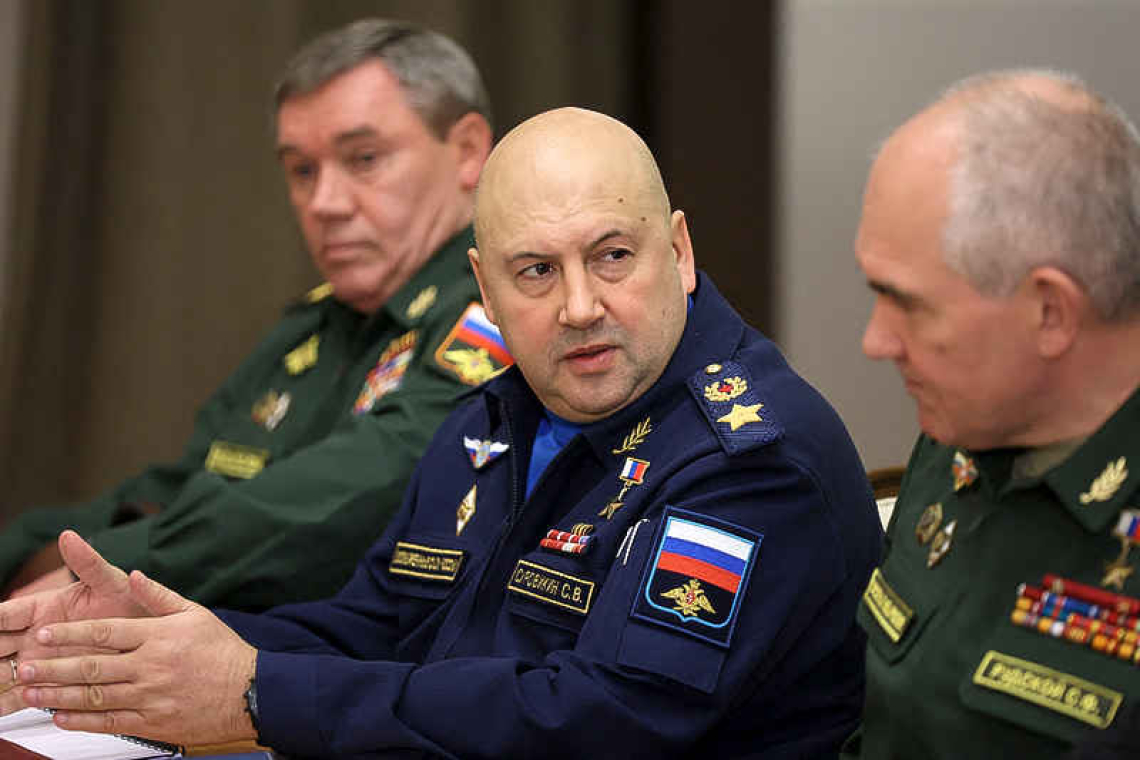Commander of Russia's Aerospace Forces Sergei Surovikin (Center), Chief of the General Staff of the Russian Armed Forces Valery Gerasimov and Head of the Main Operational Directorate of the Armed Forces' General Staff Sergei Rudskoi attend a meeting with President Vladimir Putin in Sochi, Russia, November 3, 2021.
KYIV--The new commander of Russian forces in Ukraine made a rare acknowledgment of the pressures they are under from Ukrainian offensives to retake southern and eastern areas that Moscow claims to have annexed just weeks ago.
And in another sign of Russian concern about the situation on the ground eight months into its invasion, the Kremlin-installed chief of the strategic southern region of Kherson on Tuesday announced an "organised, gradual displacement" of civilians from four towns on the Dnipro River.
Russian forces in Kherson have been driven back by 20-30 km (13-20 miles) in the last few weeks and are at risk of being pinned against the western bank of the 2,200-kilometre-long (1,367-mile-long) Dnipro river that bisects Ukraine. "The situation in the area of the 'Special Military Operation' can be described as tense," Sergei Surovikin, a Russian air force general named this month to take charge, told the state-owned Rossiya 24 television news channel.
On Kherson, Surovikin said: "The situation in this area is difficult. The enemy is deliberately striking infrastructure and residential buildings in Kherson."
Both Ukraine and Russia have denied targeting civilians, although Kyiv has accused Moscow's forces of war crimes. Russian President Vladimir Putin ordered what he calls a "special military operation" on Feb. 24 because he said he wanted to ensure Russian security and protect Russian-speakers in Ukraine. Ukraine and its allies accuse Moscow of an unprovoked war to grab territory from its pro-Western neighbour.
Russian troop positions in Kupiansk and Lyman in eastern Ukraine and the area between Mykolaiv and Kryvyi Rih in Kherson province were cited by Surovikin as under continuous attack. He appeared to concede that there was a danger of Ukrainian forces advancing towards the city of Kherson, which lies near the mouth of the Dnipro on the west bank, and is hard for Russia to resupply from the east because the main bridge across the Dnipro has been badly damaged by Ukrainian bombing.
Russia captured the city largely unopposed in the early days of the invasion, and it remains the only major Ukrainian city that Moscow's forces have seized intact. Kherson is one of four partially-occupied Ukrainian provinces that Russia claims to have annexed, and arguably the most strategically important. It controls both the only land route to the Crimea peninsula Russia seized in 2014, and the mouth of the Dnipro.
After staging referendums in September that Ukraine and its allies said were illegal and coercive, Putin proclaimed the annexations of the eastern border provinces of Donetsk and Luhansk - together forming an important industrial region known as the Donbas - as well as Kherson and Zaporizhzhia in the south.
Vladimir Saldo, the Russian-installed Kherson region chief, said the risk of attack by Ukrainian forces led to a decision to evacuate some civilians from four towns. "The Ukrainian side is building up forces for a large-scale offensive," Saldo said in a video statement. The Russian military was preparing to repel the offensive, he said, and "where the military operates, there is no place for civilians. Let the Russian army fulfil its task."
Surovikin has been nicknamed "General Armageddon" in Russian media after serving in Syria and Chechnya, where his forces pounded cities to rubble in a brutal but effective scorched earth policy against its foes. His appointment was rapidly followed on Oct. 10 by the biggest wave of missile strikes against Ukraine since the start of the war.
Putin cast the air strikes using missiles and drones as revenge for an explosion that damaged Russia's bridge to Crimea. The Kyiv government has not claimed responsibility for that attack but celebrated the destruction of what it considers a military target used to transport arms and troops.
Ukraine has invited United Nations experts to inspect what it says are downed Iranian-origin drones used by Russia to attack Ukrainian targets, in violation of a U.N. Security Council resolution that endorsed the 2015 Iran nuclear deal, according to a letter seen by Reuters.







